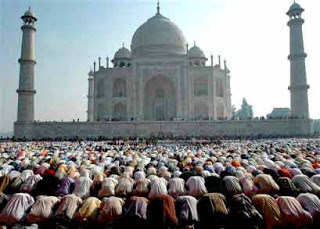Do Muslims Worship the Same God as Christians? Debate over Vatican II’s Lumen Gentium and the Catechism
Do Muslims worship the same God as Christians?
For Catholics, the issue is complicated because the Catechism of the Catholic Church and the Second Vatican Council explicitly state that Muslims “together with us they adore the one, merciful God.” This text can be one of the must frustrating and confusing passages in the entire Catechism.
Catholic Confusion about Muslim Worship and Faith
I know Catholics who publicly say that the Catechism and the documents of Vatican II are not magisterial because of this so-called “blunder” about Muslims worshipping God. Moreover, I have met Protestants of good-will who will not become Catholic because of this Catholic teaching about Muslims supposedly already knowing God.
On the opposite side of the spectrum, I have also heard some people assert that “since Vatican 2 teaches that Muslims already adore God, we don’t have to evangelize them. They are already saved.”
I’ll address all these errors and show how “Muslim adoration” statements in Vatican II and the Catechism fit in to the orthodox tradition of Catholic magisterial teaching.
I’m going to outline a nuanced answer to this question based on how Thomas Aquinas understands human knowledge of God and how Thomas understood Muslims. I’ll also use an analogy of a bow, arrow, and blind archer to make it super clear.
This topic recently came up inside the New Saint Thomas Institute and I wanted to address it here as well.
But first, let’s look at the texts:
Muslim Worship in the Catechism
The Catechism of the Catholic Church (para. 841) quotes Lumen Gentium 16 stating that Muslims “together with us they adore the one, merciful God.”
The Church’s relationship with the Muslims. “The plan of salvation also includes those who acknowledge the Creator, in the first place amongst whom are the Muslims; these profess to hold the faith of Abraham, and together with us they adore the one, merciful God, mankind’s judge on the last day.” – Catechism of the Catholic Church, paragraph 841
Muslim Worship in V2’s Lumen Gentium
Here’s the original quote from the Second Vatican Council’s Lumen Gentium:
But the plan of salvation also includes those who acknowledge the Creator. In the first place amongst these there are the Mohamedans, who, professing to hold the faith of Abraham, along with us adore the one and merciful God, who on the last day will judge mankind. – Lumen Gentium 16 from the Second Vatican Council
Thomas Aquinas on Muslims, Worship, and the True God
Thomas Aquinas, representing the Catholic tradition, teaches that non-Christians can and do have some true knowledge of God. Non-Christians (eg, Muslims) can know and hold to philosophically true propositions about God, angels, the soul, etc. Thomas calls these the praeambulae fidei, which literally mean “walking around before faith.” A non-Christian can be a monotheist who believes in life after death, angels, and even the cardinal virtues.
So Socrates and Plato knew that there was life after death and that the soul lived without the body. They also affirmed and tried to live the four cardinal virtues. Confucius came close, too. Aristotle knew that there was a Prime Mover above all motion in the universe. Here we see men before Christ affirming some of the praeambulae fidei.
According to the First Vatican Council, a human can become a monotheist and discover the primary attributes of God (eg, eternality, simplicity, unity) by following human reason. The Catholic tradition following Saint Paul has always affirmed this.
Now Muslims are a bit tricky for two reasons:
- Muslims technically have a rational conclusion that God is one, simple, etc, but they also have pieces of divine revelation, albeit corrupted through the false witness of Mohamed. Through Mohamed’s corrupted knowledge of Judaism and Christianity, they know that God created Adam and Eve, that God revealed a covenant to Abraham, and they even believe that Jesus was born of the Virgin and that Jesus was a prophet of God.
- However, Muslims are not “pure pagans” like Socrates, Plato, and Aristotle. These three philosophers had never heard of Adam, Abraham, Moses, Jesus, and they had never read the Bible. Peter Kreeft calls these kinds of philosophers “virgin pagans.” They were pagans who had never experienced Christian revelation through the prophets or Apostles. These philosophers were not technically rejecting any divine revelation made through the prophets because they didn’t have anything to reject.
Now Pagans living in the third millennium, however, are now “divorcee pagans” who once knew of Christ and the Gospel, rejected Him, and returned to paganism. There’s a big difference between Socrates before Christ and your local coven of pagans after Christ.
Muslims are more like “divorcees” because they explicitly reject the revealed doctrine of the Trinity and Jesus as the Son of God. A Muslim wouldn’t be caught dead reciting the Apostles’ Creed, to say nothing of the Nicene Creed. The Quran is aware of Catholic Christian claims and explicitly rejects them.
So Do Muslims really “adore the one, merciful God”?
Now we can tackle the question: Do Muslims “adore the one, merciful God,” and was Vatican II (and the Catechism) wrong? And, if the Catechism if correct, do we still need to evangelize Muslims?
Vatican II reads: “In the first place amongst these there are the Mohamedans, who, professing to hold the faith of Abraham, along with us adore the one and merciful God.”
Notice that it reads that Muslims “profess” to hold the faith of Abraham even though they do not. Saint Paul says the faith of Abraham was the faith of the Christian Gospel – something Muslims explicitly deny. Our Lord Jesus Christ also said that Abraham had faith in Him:
“Abraham your father rejoiced that he might see my day: he saw it, and was glad.” (John 8:56)
So Abraham implicitly believed in the Christian Gospel proclaiming Jesus as the Son of God – not in the Muslim message that states that Isa (Jesus) was just a human prophet and less than a prophet than Mohamed.
The key is “profess.” That they profess this truth sets them above other non-Christians, such as Hindus or Buddhists who don’t recognize the Abrahamic tradition.
The Analogy of the Bow and Arrow
Muslims are also said to “adore the one true God.” Thomas Aquinas would agree with this by adding a clarification.
One can “adore” in two ways.
First, one can adore rightly be adoring the right object (Trinity) and adoring in the right manner (approved liturgy, sacraments, approved prayers and forumalas). This would be the adoration that Catholics offer to the glory of God.
Secondly, one can direct adoration in the right direction but not understand the target. For example, if you shot an arrow down range but your had poor eyesight and could not see the target, then you might shoot in the right direction without seeing the destination. You shot the arrow at the proper target but you don’t see, know, perceive, or understand the target. Moreover, in this case, the bow would be too weak to get the arrow to the destination. The arrow would fall short.
This “blind archer with a weak bow” is Islam. They shoot their arrow in the right direction (toward the “God of Abraham”), but they do not understand the target and their bow is too weak because their bow lacks the power of grace.
So the Muslim “adores the one true God,” just as a blind archer “shoots at the one true target.”
Yet the Catholic “adores the one true God,” as well-practiced archer who can see the target and has a powerful 70 pound bow stringed with grace! Through Christ, our adoration is carried to heart of God.
Why Muslim adoration is insufficient
Through Christ, our adoration is made perfect and well-pleasing because Christ is the perfect and divine High Priest by virtue of hypostatic union that unites His divinity to His assumed humanity. Mohamed’s Quran explicitly denies this truth:
They do blaspheme who say: “God is Christ the son of Mary.” They do blaspheme who say: God is one of three in a Trinity: for there is no God except one God Allah. If they do not desist from their word of blasphemy, verily a grievous penalty will befall the blasphemers among them. Christ the son of Mary was no more than a Messenger; many were the Messengers that passed away before him.” Quran, Sura 5:72-73, 5:75
So Muslims should be recognized as “further along the path” than other non-Christians, but their rejection of the Trinity and their rejection of Christ as the Son of God means that their “arrow of adoration” cannot reach the intended target.
This is why Christians must be charitable witness of the Son of God, and we must continue to fund and send missionaries into Muslim nations. They profess to have the faith of Abraham, but they do not possess the fulness of God’s message for humanity.
Moreover, the greatest joy that a human person can experience this side of Heaven is the Holy Eucharist. Muslims also reject this great gift from Christ so we must prayerfully share the joy of the Gospel with Muslims so that through Baptism they might also partake of this supersubstantial Bread from Heaven.
Final Thoughts about Muslims
The statements in the Catechism and in Vatican II’s Lumen Gentium are 100% correct when read from within the tradition of the Catholic Church. Muslims have a greater share in the praeambulae fidei even though they do not have saving faith in the Holy Trinity or in Jesus as the Son of God.
They also profess to hold the faith of Abraham, but their knowledge of the target and their bow are too weak to deliver what Christ promised – to become the children of God. Although we grant a “higher status” to Muslims over polytheist pagans, we must still actively and prayerfully evangelize Muslims so that they can experience the joy of Christ and the great gift of the Eucharist.
Action Item: for Persecution of Christians in Iraq
Since there is increased persecution of Christians in Iraq, please share this post on Facebook to provide clarity on this crucial topic. You can share it on your Facebook wall by clicking here.
What to Watch Next
SHOP THE TAYLOR MARSHALL STORE
Dive Deeper

GET CONFIDENT IN YOUR FAITH
Explore the fascinating world of Catholic teachings with Dr. Marshall. Together you’ll unpack the brilliant answers the Church gives to tough questions about the Faith. The best part: you go at your own pace. Start this exciting journey today.


 >
>





